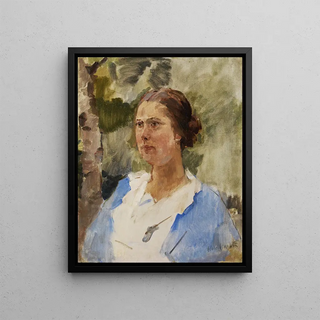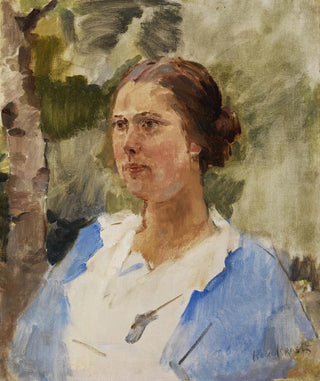Art print | Portrait of a young woman - Isaac Israëls


View from behind

Frame (optional)
Portrait of a Young Woman - Isaac Israëls – Captivating Introduction
Isaac Israëls's "Portrait of a Young Woman" is a work that captivates with its delicacy and keen sense of observation. Painted at the end of the 19th century, this painting not only showcases the undeniable talent of the artist but also reflects an era when Impressionism was beginning to establish itself as a major movement in the art world. The young woman, with her gaze both thoughtful and sparkling, seems to address those who contemplate her image, creating an intimate connection between the viewer and the subject. This portrait, both personal and universal, invites an exploration of human emotions while revealing the subtleties of everyday life.
Style and uniqueness of the work
The uniqueness of this piece lies in Israëls's mastery of colors and lights, deployed with astonishing ease. The soft hues and delicate nuances of the young woman's skin contrast with the darker background, highlighting her luminous face. The choice of colors is not limited to a simple reproduction of reality but is part of a quest for emotional expression. The composition, though classical, is animated by a certain modernity, reflecting the evolution of pictorial techniques of its time. The brushstrokes, both fluid and precise, reveal a sensitivity to texture and light, characteristic of Impressionism. This art print does not merely depict a female figure; it also pays homage to the fleeting beauty of the moment, capturing an ephemeral essence that still resonates today.
The artist and his influence
Isaac Israëls, born in 1865 in Amsterdam, is often regarded as one of the most prominent representatives of Dutch Impressionism. Son of painter Jozef Israëls, he was immersed from a young age in an artistic environment conducive to the development of his talent. His career led him to Paris, where he mingled with influential artists who shaped his style. Israëls is distinguished by his ability to capture the nuances of modern life, particularly that of women of his time, often depicted in scenes of

Matte finish

View from behind

Frame (optional)
Portrait of a Young Woman - Isaac Israëls – Captivating Introduction
Isaac Israëls's "Portrait of a Young Woman" is a work that captivates with its delicacy and keen sense of observation. Painted at the end of the 19th century, this painting not only showcases the undeniable talent of the artist but also reflects an era when Impressionism was beginning to establish itself as a major movement in the art world. The young woman, with her gaze both thoughtful and sparkling, seems to address those who contemplate her image, creating an intimate connection between the viewer and the subject. This portrait, both personal and universal, invites an exploration of human emotions while revealing the subtleties of everyday life.
Style and uniqueness of the work
The uniqueness of this piece lies in Israëls's mastery of colors and lights, deployed with astonishing ease. The soft hues and delicate nuances of the young woman's skin contrast with the darker background, highlighting her luminous face. The choice of colors is not limited to a simple reproduction of reality but is part of a quest for emotional expression. The composition, though classical, is animated by a certain modernity, reflecting the evolution of pictorial techniques of its time. The brushstrokes, both fluid and precise, reveal a sensitivity to texture and light, characteristic of Impressionism. This art print does not merely depict a female figure; it also pays homage to the fleeting beauty of the moment, capturing an ephemeral essence that still resonates today.
The artist and his influence
Isaac Israëls, born in 1865 in Amsterdam, is often regarded as one of the most prominent representatives of Dutch Impressionism. Son of painter Jozef Israëls, he was immersed from a young age in an artistic environment conducive to the development of his talent. His career led him to Paris, where he mingled with influential artists who shaped his style. Israëls is distinguished by his ability to capture the nuances of modern life, particularly that of women of his time, often depicted in scenes of






